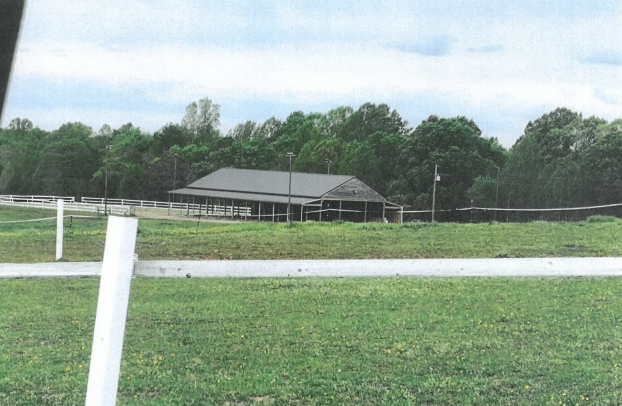Renovation Continues: Luther P. Jackson School committee forms
Published 12:01 am Thursday, May 29, 2025

- A look at Luther P. Jackson
|
Getting your Trinity Audio player ready...
|
Cumberland County now has a full committee in place, ready to make decisions in regards to the Luther P Jackson School. Members of the county’s economic development authority (EDA) approved five community members to serve on the project during their Tuesday, May 20 meeting.
Back in November 2024, Cumberland supervisors agreed to move forward and create the Luther P Jackson School Committee. Before we detail what’s been happening with the committee, let’s first explain what the assignment is. The goal will be for the committee to help drive renovation ideas, come up with ways to use the building and to help tell the story of the school, why it was created and the part it played in Virginia history. Cumberland supervisors back in November said the committee will help direct historical interpretation, such as tours and programs, sharing details about the school from its beginning in 1952. Maybe that comes in the way of visual aids that people can read as they walk through the building. Maybe it’s through oral histories, shared through tours.
But before you can move forward with any of those things, you need committee members. The group will consist of Cumberland Administrator Derek Stamey, Assistant County Administrator Jennifer Crews, Superintendent of Community Operations Bryan Saxtan, Recreation Director Samantha Pankay and Supervisors Eurika Tyree and Paul Stimpson, plus five community members. In November 2024, Cumberland officially put out the call, requesting people to apply to be part of the committee. Between then and March 2025, seven applications came in. And in their May 20 meeting, the EDA chose Ronald Spears, Ida Puryear, Joann Petty, Jimmy Johnson and Jeta Thomas to serve.
‘We’re going to save it’
This falls under the EDA’s authority because the group actually owns the Luther P. Jackson school building. The idea here, Stamey told the board on May 20, is to renovate and use the building in a number of ways. First, focus on grants and other opportunities to fund a historical interpretation of the school’s history, similar to Farmville’s Moton Museum.
When Prince Edward supervisors shut down schools rather than follow the orders to integrate, students had to go to Cumberland County, where officials had an addition built at Luther P. Jackson School. The history of that period in particular, from 1959 to 1964, is part of what would be on display in a renovated building.
Beyond that, county staff see this as a place that could be a community facility once again. There is an auditorium in the building, one that could host community plays, town hall meetings, public forums or any number of activities.
“Now it’s got problems, it’s got asbestos and it needs work,” Stamey told the EDA. “But I can see this being a thriving community facility. You can have all types of activities in this building.”
So how do you achieve all this? First off, the newly formed Luther P. Jackson committee will need to meet and come up with a mission statement, as well as goals, objectives and a work plan. That means specifically identifying what the building will be used for, what it will look like and then how to integrate the history and museum piece into operations.
There are a few things already in progress. First, county staff, namely Mr. Saxtan and his staff, are working to develop a meeting space in an existing classroom in the building. The plan would be to hold committee meetings there and possibly some EDA meetings as well.
Second, the committee will be working to identify historically significant artifacts to preserve and set up to display, such as photos and yearbooks, among other items. Third, the county is working to get Luther P. Jackson School designated as a historical landmark.
“It’s in need of a lot of work, but we’re going to save it,” Stamey told the EDA.
Who was Luther P Jackson?
But what about the school’s namesake? Who was Luther P Jackson? He is considered one of Virginia’s first civil rights activists of the 1930s and 1940s. Serving as a professor of history at Virginia State College in Petersburg for almost 30 years, Jackson was focused on research.
He authored Free Negro Labor and Property Holding in Virginia, 1830–1860, a 1942 research paper that challenged stereotypes of antebellum black residents. Three years later, he followed that up with Negro Office Holders in Virginia, 1865-1895. The purpose in these and several other of his more than 60 books and articles, Jackson said, was to show African Americans as productive citizens throughout history, proving they owned businesses and houses, as well as ran for and got elected to political office, all long before 1900.
He also helped found the Petersburg League of Negro Voters in 1935 and wrote a weekly newspaper column titled “Rights and Duties in a Democracy”. Jackson is also known for challenging Richmond’s segregated public transit system. He would go on to fight for civil rights up until his death in 1950. The school bearing his name went up in Cumberland in 1952 and after integration, it was converted into an elementary school, which ultimately shut down.
BRIAN CARLTON is the regional editor for the Farmville Herald and its sister papers. He can be reached at brian.carlton@farmvilleherald.com.





